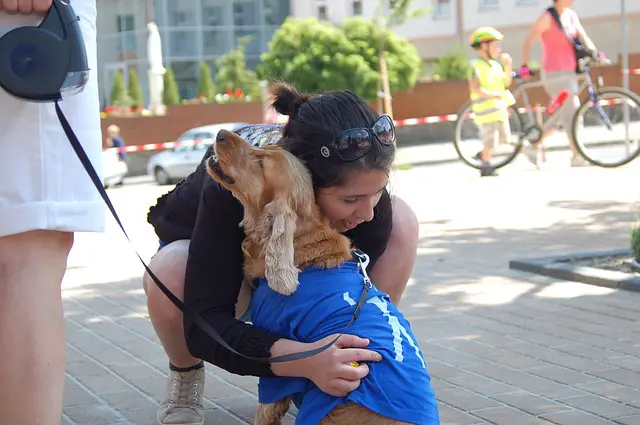Service dogs (also called assistance dogs) are a category of working dogs.
They can fill a number of different roles and carry out different tasks for people with mental or physical disabilities, depending on the special training the dog receives. This allows the person a certain quality of life or independence they may not otherwise have.
Different breeds of dogs may be commonly used for types of different services.
In the guide below, we’ve listed some of the different types of service/assistance dogs.
(NOTE: this is a general information guide only, and is not professional advice, or a substitute for professional advice. A qualified vet or animal expert is the only person qualified to give you expert advice in regards to your pet/s)
Different Types Of Service & Assistance Dogs
1. Guide Dogs
Help the blind and visually impaired
Common tasks might involve helping their owner navigate around, as well as potentially alerting them about hazards and risks
2. Hearing Dogs
Help those who are deaf of visually impaired
Might be trained to exhibit certain behaviors or actions for their owner when the dog hears or sees certain things.
3. Diabetic Alert Dogs
Can help those with diabetes
Trained to identify certain smells from the breathe or sweat for example (or the body in general), that indicate high or low blood sugar levels. They can prompt their owners to test their blood sugar level if it’s too high or low
4. Seizure Alert Dogs
Can help those who might be prone to seizures, such as those with epilepsy
Seizure alert and response dogs are trained separately for different skill sets
Seizure alert involves being able to alert the owner that a seizure might be about to happen
5. Seizure Response Dogs
Can help those who might be prone to seizures, such as those with epilepsy
Seizure alert and response dogs are trained separately for different skill sets
Seizure response dogs are trained to respond in the event of a seizure. They can for example trigger a help alarm, and/or bark to try to attract help, and remain calm until help arrives
6. Psychiatric Service Dogs
Can help people with a range of psychiatric conditions/issues such as anxiety, depression, PTSD, and so on
They can perform a range of tasks from calming and emotionally supporting their owner, to guiding them to stay away from certain triggers
7. Mobility Assistance Dogs
Help people who might have a range of mobility problems
Can perform many tasks in the home or out in public such as fetching certain items, assisting with a wheelchair, pulling or guiding certain items, and so on
8. Autism Support Dogs
Help people with autism
Can be a friend, but can also provide support and have a calming effect. Can also help with socialization with other people
9. Allergy Detection Dogs
Helps people with a range of allergies
Trained to sniff out the presence of certain foods or ingredients or substances that could trigger an allergic reaction in humans
An example is a dog trained to detect nuts like peanuts
10. FASD Dog
Helps children who had fetal drug or alcohol exposure, and now has for example fetal alcohol spectrum disorder
One of the things they are trained for is behavior disruption and interruption
11. Therapy (& Facility) Dogs
Therapy dogs are not always technically service/assistance dogs, but might be under certain circumstances
They can be used in places such as hospitals, retirement homes, nursing homes, schools, libraries, hospices, or disaster areas.
They can be used for people undergoing physical and mental therapy, and might be used for things such as comfort and support
Note that there is a difference between a facility dog (trained by an accredited assistance dog organisation), and a therapy dog which is trained by it’s owner
Friendly Disclaimers
TheDailyShep.com is a participant in the Amazon Services LLC Associates Program, an affiliate advertising program designed to provide a means for sites to earn advertising fees by advertising and linking to Amazon.com.
Amazon and the Amazon logo are trademarks of Amazon.com, Inc., or its affiliates.
Additionally, TheDailyShep.com participates in various other affiliate programs, and we sometimes get a commission through purchases made through our links.
TheDailyShep.com are not veterinarians, or animal professionals/experts. Information provided is for informational purposes only – it is not a substitute for professional or qualified advice.
The information is based on either our own thorough research, and/or own experiences, as a means of free speech.
By consuming this information, you accept that TheDailyShep.com do not have client or patient relationship with you, and TheDailyShep.com are not advising you to act on anything you read.
You should always consult your own veterinarian, animal expert, or health care professional and follow their advice before making decisions on all matters.
You can find our full set of disclaimers and T & C’s in the footer of this site
Enjoy your reading, and thank you for being here
','' ); } ?>
